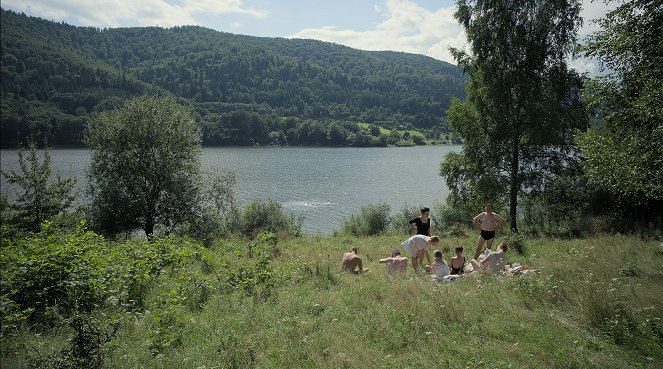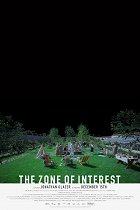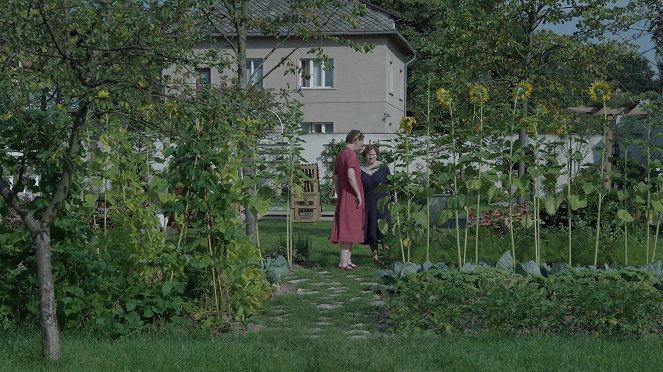Directed by:
Jonathan GlazerScreenplay:
Jonathan GlazerCinematography:
Łukasz ŻalComposer:
Mica LeviCast:
Sandra Hüller, Christian Friedel, Ralph Herforth, Freya Kreutzkam, Max Beck, Ralf Zillmann, Imogen Kogge, Stephanie Petrowitz, Marie Rosa Tietjen (more)VOD (4)
Plots(1)
The commandant of Auschwitz, Rudolf Höss, and his wife Hedwig, strive to build a dream life for their family in a house and garden next to the camp. (SF Studios Fin.)
Videos (4)
Reviews (10)
Jonathan Glazer is again powerfully creative and artsy. In The Zone of Interest, we don’t see a single Auschwitz prisoner in the film or any of the atrocities perpetrated behind the walls of the camp. The minimalistically staged but effectively arranged action takes place inside the Hösses’ villa and in their garden, which is bordered by the wall, over which the tops of the concentration-camp barracks loom. Höss dutifully goes to “work” and spends his free time with his family. Höss’s wife enjoys the flowers in the garden. Their children play by the swimming pool. Höss occasionally receives a visitor on business, such as engineers with a design for a more efficient crematorium. Sometimes someone brings them a bag of nice clothes to pick through... The whole time, we hear the distant droning of the death factory in operation, sometimes people screaming, dogs barking, gunfire. Black clouds of ash fill the sky. The Höss children’s perception of the world outside the house is also evident in small nuances. The little girl’s nocturnal dreams in black-and-white inverted images are the most impressive of the artistic ornaments with which the film is packed to the maximum satisfaction of the festival viewer. The scene with Höss on the stairs with the dark empty corridors is brilliant and the highlight of the film in my opinion. The Zone of Interest is a different view of the Holocaust, with the most unpleasant music you have ever experienced accompanying the closing credits. This puts Jonathan Glazer in the company of masters like Michael Haneke and Yorgos Lanthimos. [Cannes FF]
()
A formally interesting experiment (being created concurrently with the book of the same name by Martin Amis), drawing attention to a topic that we should have already processed. Many fundamental questions concerning the primary human attitude, such as "How could the main commander of the Auschwitz concentration camp, Rudolf Höss, calmly sleep, go home every day, and peacefully have dinner with his family...?" should not be posed for the first time by a co-produced film. Similarly, the everyday life of Höss's wife, Hedwig, should not surprise or fascinate us for the first time. On the contrary, we should have a rich knowledge of the reality of the war and be able to work with it. Many prominent women from this time have written memoirs, which in many ways only repeat, complement, and explain to us what and why happened in their lives. They serve excellently as memories, especially the memoirs of secretaries Traudl Junge, Brunhilde Pomsel, and Louise Fox. The question of obedience to authorities and blind fulfillment of orders was thoroughly analyzed by Hannah Arendt in her series of reports "Eichmann in Jerusalem: A Report on the Banality of Evil". Furthermore, we should be immune to demonizing the German language itself and always remember that the Third Reich existed for only 12 years and is primarily the language of Goethe, Schiller, and Rilke. It is absurd to what extent the current public is not interested in the new film Terezín, but the Oscar-nominated The Zone of Interest naturally appeals to moral values and interest in the matter. However, if this trendy film brings some understanding even to those viewers who only watch new titles, this concession can be accepted.
()
Auschwitz without the gunfire, the wailing and the dying. An original premise, where a lot can be invented, but where there is also a constant risk of boredom without emotions. Jonathan Glazer comes up with a version that in regular intervals shows ideas to illustrate a typical day of the head honcho of the concentration camp at the gates of Auschwitz. Although there are no downright deaf spots, as a whole, however, the film, in all its ordinariness, fails to be fully engrossing. All credit goes only to some excellent scenes, notably the Sunday fishing or the imprisonment in the greenhouse.
()
The Zone of Interest depicts the concentration camps and the Holocaust from a truly novel point of view, and this is why it will not be lost among the thematically close films. Jonathan Glazer's film does not primarily target the audience's eyes, but rather their ears and general awareness of the horrors of war: at first glance we see the ordinary life of an ordinary family, but on second viewing (or listening) and placing the film in the context of the time, it evokes extremely uncomfortable feelings. On the one hand we have an idyllic, almost 'Garden of Eden', on the other (behind the fence) we can hear screams and gunshots, while in the distance we watch the smoke (of death). To the sound of a sometimes literally poignant musical score, we witness that pure evil can take on a completely mundane, innocent form. As in Anatomy of a Fall, Sandra Hüller gives a supremely impressive performance and I'm curious to see what roles await her in the future. Last but not least, I praise the play with negative imagery, which contributed to the film's unpleasant atmosphere. Perhaps only the closing documentary insert left me with mixed feelings.
()
We have seen the horrors that took place in concentration and extermination camps many times on the cinema screen, but this time we take an unconventional look from the other side of the wall, at the life of an Auschwitz commander and his family. Well, it's a disgustingly perfect idyll: a lovely home, a beautiful garden with a pool, a house full of servants; the Höss don't lack for anything. What is happening behind the wall is presented to the viewer only in small "icy" details: the young son playing in the beautiful flowering garden and behind him in the house we see only the steam rising from a train arriving at Auschwitz; the family celebrating a birthday in the garden and behind them we see the incinerator in full swing; they are bathing in the river and suddenly ashes start falling down on them. We all know very well what that means, Jonathan Glazer is counting on it, and he manages to create a perfectly chilling contrast. It also presents a picture of a happy family, which is something I thought about many times in the past because I always found it very controversial. We know all too well what monsters the SS could be, but at the same time they could be, and probably were, loving fathers, something that is beautifully portrayed here. Rudolf Höss is a likeable dad (if it weren't for his uniform, he wouldn't be so different from your friends), but then he picks up the phone and starts figuring out how to streamline the final solution to the Jewish question; at a social event his wife asks him who were the people there and he answers that he doesn’t care about the people, that he was thinking how to gas everything, but it was logistically difficult – that was quite hard to stomach. It took me a while to get used to the way the film is shot, it feels a bit documentary-like, and by the end credits I almost ripped my ears off from the accompanying "music" in agony, but it was a very powerful experience. [Festival de Cannes 2023]
()
Gallery (12)
Photo © A24



Ads